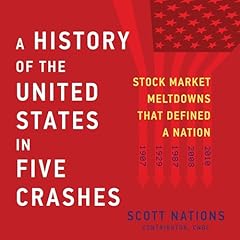
The Panic of 1819
The First Great Depression (Studies in Constitutional Democracy)
No se pudo agregar al carrito
Add to Cart failed.
Error al Agregar a Lista de Deseos.
Error al eliminar de la lista de deseos.
Error al añadir a tu biblioteca
Error al seguir el podcast
Error al dejar de seguir el podcast
Obtén 3 meses por US$0.99 al mes
 Exclusivo para miembros Prime: ¿Nuevo en Audible? Obtén 2 audiolibros gratis con tu prueba.
Exclusivo para miembros Prime: ¿Nuevo en Audible? Obtén 2 audiolibros gratis con tu prueba.
Compra ahora por $24.94
-
Narrado por:
-
Kevin Moriarty
The Panic of 1819 tells the story of the first nationwide economic collapse to strike the United States. Much more than a banking crisis or real estate bubble, the Panic was the culmination of an economic wave that rolled through the United States, forming before the War of 1812, cresting with the land and cotton boom of 1818, and crashing just as the nation confronted the crisis over slavery in Missouri.
The Panic introduced Americans to the new phenomenon of boom and bust, changed the country's attitudes towards wealth and poverty, spurred the political movement that became Jacksonian Democracy, and helped create the sectional divide that would lead to the Civil War. Although it stands as one of the turning points of American history, few Americans today have heard of the Panic of 1819, with the result that we continue to ignore its lessons - and repeat its mistakes.
The book is published by University of Missouri Press. The audiobook is published by University Press Audiobooks.
"Andrew H. Browning masterfully recreates the events and chronology of the new nation's first great depression, the Panic of 1819." (The Journal of Economic History)
"The Panic of 1819 is a book that no historian of the early republic can afford to miss." (Missouri Historical Review)
"This book is sure to elicit lively discussions of the political and economic history of the early republic." (The Economic Historian)
©2019 The Curators of the University of Missouri (P)2020 Redwood AudiobooksLos oyentes también disfrutaron:






















